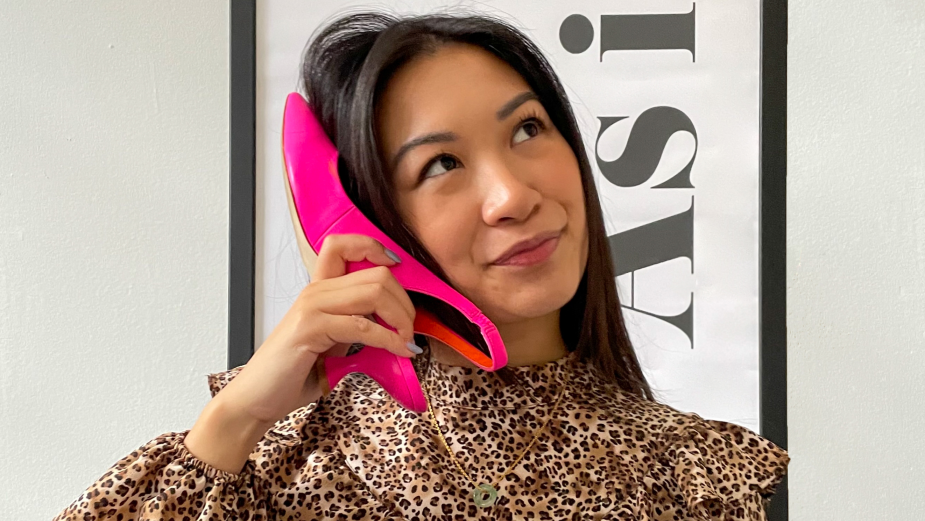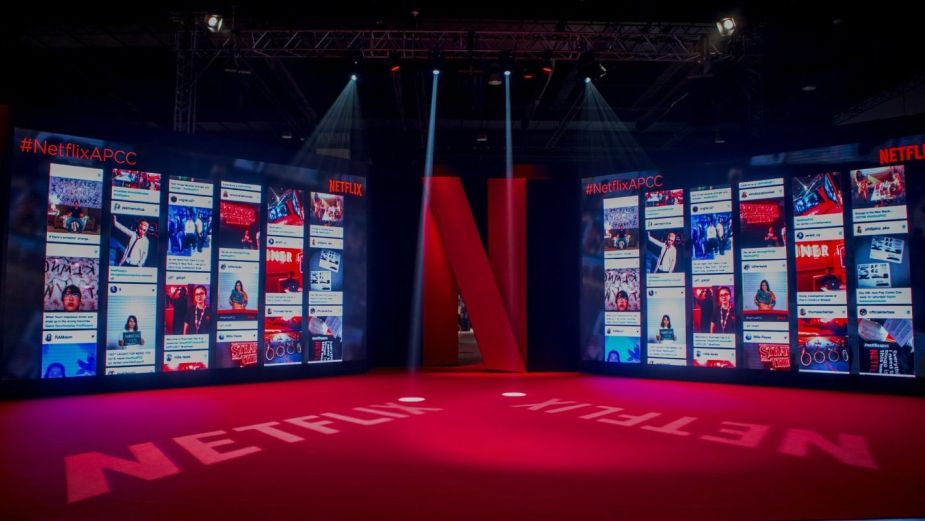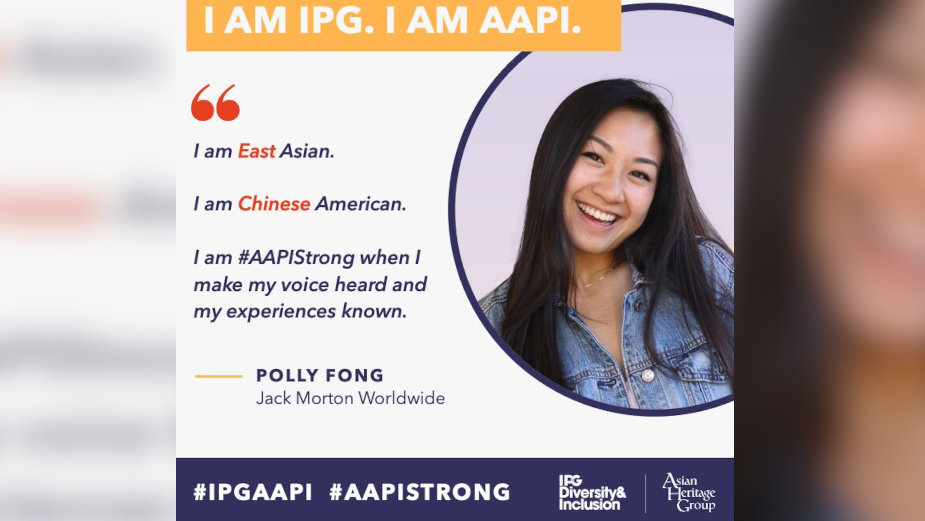
Uprising: Polly Fong on Producing Experiences That Make People Feel Human

“I tended to the fairies that played at the base of large trees, where thick and gnarled roots above the soil defined different spaces on the ground - an offering of flower petal soup here, a layer of the softest leaves for lodging there... At home, leftover plywood from my father’s pick-up truck became the plank that transported me from my driveway to a pirate ship at sea.”
Polly Fong is an associate copywriter at Jack Morton, where she continues to use her youthful creativity and playfulness to help produce unique and engaging works of experiential advertising.
Polly is grateful to have forged a career that speaks to her childhood desires for creativity, imagining realities and storytelling, a career that - at one point - seemed unlikely. “I was confident in becoming an artist. My 96-pack of Crayola crayons would take me very far, I reasoned,” she says. “But somehow, who you want to be at a very young age - at the core of it - gets muddled. So for a long time, I didn’t think I would end up as an artist.”
Since her childhood, art and writing were two of Polly’s biggest passions, plastering any open space of her house with drawings and filling notebooks with stories and illustrations. “They tended to be adventure stories inspired by The Magic Treehouse series and books by Roald Dahl. My longest story was written in the third grade, following ‘Amelia’ and a rag-tag bunch of rainforest animals in a Wizard of Oz-esque adventure.”
Polly was born and raised in the US, after her parents emigrated from China, and struggled to accommodate the two distinct cultures simultaneously. “I wanted to assimilate so badly. I wanted to fit in - as if finding PB&J sandwiches and a Capri Sun in my crinkled brown lunch bag would magically transform me,” says Polly. “I became very insecure of my personality - conditioned to not speak up in class and priding myself on being ‘adaptable’ to any social situation in order to appease everyone. I thought for a long time that being meek with safe opinions was who I am. It wasn’t until this past year - emotions unearthed by the national surge in anti-Asian hate crimes – that I realised how much my cultural background impacted my outlook on who I am and what I’m capable of.”
The associate copywriter says she enjoys running in Central Park and - jokingly - happy hours “that last a bit too long”. Conversely, after work she likes to decompress with a fiction book and describes herself more as an “extroverted introvert”, attributing her ambition and curiosity for new experiences to her parents’ work ethic and sacrifice, as well as a desire to escape small-town living. “Above all, I see the glass as always half full. I don’t quite believe in wishful thinking, but I do believe that I’m in control of my happiness and outlook in life. I appreciate the small things.”
Just a month after uprooting her life, moving from San Francisco to New York, the pandemic hit. Just to create her own space in a shared, one-bed New York apartment, Polly even had to hire a company to build a wall in the living room. “To be confined in that space - for months - in a brand-spanking-new city, at the worst period of the pandemic, and separated from my co-workers and family in the West Coast… it was hard.”
Despite these difficulties, Polly remains grateful for her situation. “Discomfort is a huge sign of growth. If you’re not slightly terrified or nervous doing something new, how will you ever be prepared for what’s next?” Following the challenges that the pandemic posed, she expresses her redoubled gratitude for the health and wellbeing of her friends and family, the selflessness and bravery of the healthcare workforce, and the fact that she works for a company that “took care of its people” during the pandemic. “Lockdown was hard. And gruelling. But in it, I discovered resilience and a newfound appreciation for the simplicity of human connection.”
Polly graduated from UCLA with a bachelor's degree in communication studies - changing from her originally intended vocation of economics - after developing a curiosity for social sciences and writing.
“I owe so much of who I am and where my career is to my time at UCLA. I had the privilege of receiving a world-class education and experiencing one of the most culturally vibrant and diverse cities in the entire country.” Polly says, “My internship experiences also allowed me to touch a huge variety of industries – start-up culture, entertainment, consumer packaged goods, live events, and even healthcare. But most importantly, all the late nights, brilliant people, and corner taco trucks netted out a version of myself that I’m pretty proud of!”
Post-graduating, and after trying a range of opportunities in the marketing sphere, experiential advertising presented itself as a chance to unite two of Polly’s passions - writing and emotional storytelling.
Working at NBCUniversal, Polly would experience a moment of inspiration. “One day I was invited to sit in on a pitch… and an agency came in, beignets in boxes, and pitched idea after idea,” she says. “I was so captivated by the work and the energy that I didn’t even take notes. As an intern, it’s almost a cardinal sin to not take notes - so yeah. I was blown away.”
Soon she was at her first agency job, where she was able to develop her skills - copywriting, graphic design, art direction and storytelling. Formally on the accounts team, the boutique nature of the agency at the time (NVE Experience Agency) meant that Polly would have to take on many roles that allowed her to develop her creative abilities. “I owe so much to Katrina Jameson and NVE for showing me that being creative was a career path and that my craft was something valuable.”
Polly’s first professional project was a “transportative red-carpet and after-party experience” for Netflix, which turned out to be a defining moment in the beginnings of her career. “Actual clients were going to see my work! It’s a wonderful memory. For the first time, everything clicked. I spent three summers and over four internships waiting to feel exactly how I felt right then and there. Where I thought I lacked confidence and bravery in myself, I found it in my work.”

Coming through the accounts team and not from a creative background, Polly felt pressured to impress her contemporaries in the office. “The Imposter Syndrome was so real! But the best thing I did for myself was to take each project as an opportunity to bridge the gap between where I was, and where I wanted to be,” says Polly, who also reveals that it can be hard to have the confidence to advocate for yourself. “I struggle with the confidence to communicate my ideas. It almost feels like trying to unlearn a big piece of myself. It’s unlearning the necessity to maintain face and being just a bit braver in admitting the bad ideas - in order to get to the good ones.”
Now, no longer writing analytical papers or working on an accounts team, she can enjoy her favourite parts of the work that satiate her creative needs. “For me, it’s 100% the creative process - it’s not about the finish line, but it’s the journey. It’s the research, the weird and wild brainstorms, the fine-tuning of ideas.” Through this work, Polly hopes to create experiences that resonate with people - from belly laughs to a “slight grin”, she believes great work can move and inspire people.“When you make people laugh, it means they reacted to it. That’s the root of why I love experiential marketing - creating experiences that move people - whether they’re salespeople or tech people. I aspire to produce work that makes people feel human.”
Threading a human element into her work also comes from a surprising source of inspiration for Polly - electronic music. Speaking about DJ and multi-instrumentalist ‘FKJ’ (French Kiwi Juice) she reveals her reasoning. “The guy is killer on the sax and piano. He turns his craft and skills into a visual and audio art form. He produces work that defies the notion that electronic music lacks a bit of soul or humanity – through spontaneous improvisations and an ear for music that moves you.”
Like many creatives, music is a vital source of inspiration for Polly and creating niche playlists for any scenario has become somewhat of an addiction. “Songs that make you feel like you’re in a Wes Anderson film? Cooking on a Sunday night? Brooding jazz for drinking whiskey and smoking cigarettes? Neither are things I do, but the vibe’s there.”
To stay fresh and ahead in the exciting world of experiential marketing, Polly highlights how important it is to have a breadth of influences. Eager to be up to date, she reads publications and newsletters spanning multiple disciplines and industries. “I’m an email marketer’s dream. A creative director I admire once told me that inspiration comes from anywhere - anything consumed in the world is valuable, as long as you’re curious.”
Taking inspiration from these sources and influenced by working in an industry “predominantly comprised of brilliant and kick-ass women”, Polly loves engaging in conversations about social and gender inequalities in the workplace. She also believes that the future of marketing lies in finding and nurturing diverse talent, something that Polly says will never truly be achieved if marketers and advertisers continue to use homogenous teams to produce work and make decisions. “It wasn’t a straightforward path to break into the industry,” she says. “I’ve only recently realised the importance of representation - realising that sometimes, working as hard as you can might not get you to where you want to be, if the system wasn’t made for you in the first place.”
During the pandemic, there was an increase in cultural conversations about being Asian in the United States. Polly and two colleagues founded AAPI@Jack - Jack Morton’s first employee resource group - which provides a network for Asian American and Pacific Islander employees to support each other and build a community. “We didn’t realise how deeply rooted and buried our emotions were, and those conversations led us to confront the diversity issue across the industry. With support from the wider agency, we’re working to affect DEI first within Jack Morton in the capacity that we can.” The group, now almost 20 strong, meets monthly on a dedicated Slack channel.

A leader in the field for cultural representation and diversity is Michelle Lee, VP editorial and publishing at Netflix, a fellow Asian American who Polly says has inspired her, by taking risks and speaking out to represent and uphold her values at a high level. “Michelle represents a core piece of who I aspire to be - someone who can give a voice to underrepresented communities. Someone with a platform to spotlight the real stories of diversity.”
Polly says she identifies with the “immigrant mentality” that Michelle Lee attributes her success to, and feels represented by her, as one of the very few Asian American, women leaders in the industry. “She’s rewriting the cultural conversation. And that’s what I aspire to do, too.”
What motivates Polly to do and be everything that she wants is an “innate craving” to embrace life and experience both diversity and adversity. “The good times and bad”, Polly says, is what nourishes and grows a person - a reminder that “you’re alive!”
“It’s about believing that there’s more - in myself, in my work, in life. Stagnancy is terrifying. And settling? That’s my biggest fear.” Polly says.
“Life’s too short. And I’ve got a lot to do while I’m still around.”













.jpg)